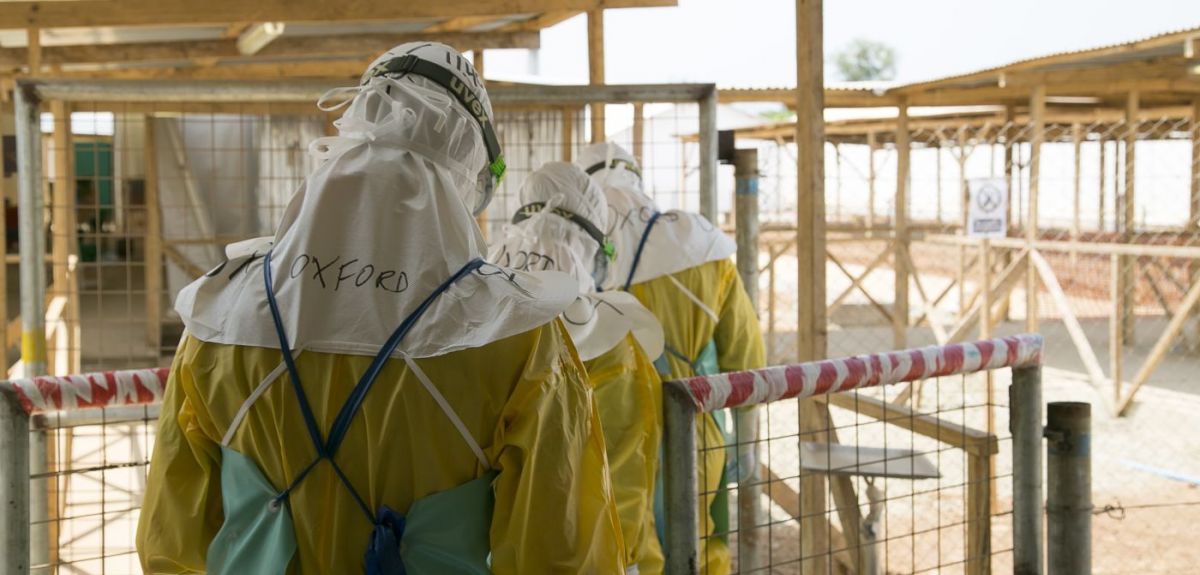
Prof Peter Horby
Ebola drug triallist advocates international cooperation to beat the next outbreak
A team that set up a clinical trial of a drug in record time as part of efforts to beat Ebola say that researchers, health authorities and the UN need research to be planned in to the response at the outset if we want to beat disease outbreaks.
Writing in the journal Nature, Dr Trudie Lang, Professor of Global Health Research at Oxford University, says that the World Health Organisation (WHO) should take the lead in coordinating research during outbreaks to make sure that treatments are assessed within outbreak. She says that research is considered too late by the organisations.
Professor Lang was part of a team funded by the Wellcome Trust to set up a trial for a potential Ebola treatment, brincidofovir. The team, which included West African medics and personnel from charity MSF, had the challenge of designing a robust trial that met international standards and that could be implemented safely and effectively in the middle of a highly-infectious disease outbreak.
Professor Lang said: 'Research is rarely conducted in an outbreak, which is why we do not have any licensed Ebola treatments. Furthermore, setting up clinical trials is notoriously slow and cumbersome, so we were aiming to be radically faster than previously thought possible.'
The team set up a trial in 16 weeks, remarkably fast compared to the 18 months it usually takes. In Nature Professor Lang sets out the lessons they learnt throughout the process.
An ambition to use African specialists to deliver the trial was complicated by visa requirements, while a wait for contracts to be signed added six weeks to the set-up time. The safety precautions required meant that only small numbers of patients could take part at any one treatment centre, but access to new centres could be difficult to negotiate.
That issue was compounded by competition between various clinical trials projects for access to patients. Professor Lang explained: 'This un-orchestrated 'land-grab' for sites and patients was a serious problem that became more obvious as numbers of cases fell, and we failed to address this, the process should have been led and orchestrated by a strong and neutral international body.'
Some things did go well: cooperation between researchers, regulators and local and international healthcare providers meant that trials were set up quickly. The various research groups shared experiences and agreed standardised outcome measures and data sharing, making cooperation and comparison of data easier.
Based on that experience, Professor Lang is clear that for things to go better in the next outbreak there must be agreement now on how to integrate research into the emergency response.
Professor Lang advocates pre-agreed plans for trials, addressing common contractual snags like data ownership or drug pricing. This would be supported by a roster of 'on-call' clinical trials specialists from around the world to enable faster assessment of treatments.
She said: 'We also need the World Health Organisation to act as a coordinator for research, to avoid the situation where several trials are started but find it difficult to get to a meaningful conclusion for lack of time or patients. It may well be better to have WHO select just one trial at a time to assess the most promising treatment or to run a single trial comparing possible treatments from different research teams.
'There needs to be an independent scientific review process to agree what is the priority in terms of trials and then there should be a collaborative effort to ensure that these studies can start and complete within the outbreak’ All stakeholders need to focus on the human reality: This outbreak has killed thousands of people. There will be further outbreaks, not only of Ebola but of other pathogens like SARS or west Nile Virus. We still have no treatments for any of these and we will only get confirmed safe, effective treatments if we can do the necessary research properly. This is a global challenge; to address it we need an international agreement for the WHO to lead any future response to include coordinated research.'
 Expert Comment: Chatbot-driven sexual abuse? The Grok case is just the tip of the iceberg
Expert Comment: Chatbot-driven sexual abuse? The Grok case is just the tip of the iceberg
 New study finds that stopping weight-loss drugs is linked to faster regain than ending diet programmes
New study finds that stopping weight-loss drugs is linked to faster regain than ending diet programmes